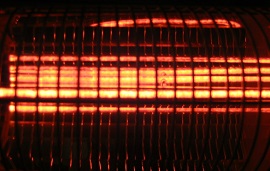As colder weather approaches, many people worry about the cost of their heating bills. Unfortunately, there are a number of common heating myths, which could be confusing when you are trying to save money on your utility bills.
Cranking Up the Thermostat Warms Your House Faster:
Many homeowners think that they can warm up their residence more quickly by turning the thermostat to maximum. Unfortunately, this is not the case, and this technique could actually burn more energy. When you turn the thermostat to maximum it will not increase the amount of heated air released into the home. Additionally, if you forget about the thermostat until your home feels overly hot, you will have wasted lots of energy.
Ceiling Fans Are Only Useful in Summer:
Most of us only consider ceiling fans in hot summer weather, but they can be useful all year round. You can actually increase the energy efficiency of your heating by using your ceiling fan to force the warmed air back down into the room, since warm air rises. This can increase the warmth in your room without needing to use additional furnace output.
Portable Heaters are Less Expensive than Central Gas Heating:
If you are trying to save money on your energy bills, you may be tempted to turn off your central heating and use a couple of portable heaters in high traffic areas. Although you may only be wanting to heat a smaller area, portable heaters can actually cost you more. The higher costs of electricity means that it can cost up to five times more to use portable heaters compared to using a gas furnace.
A New Water Heater Will Offer Massive Energy Savings:
Although newer water heater models tend to have a higher Energy Star rating, this does not necessarily mean that replacing your existing unit will offer massive savings. There are a number of other factors that determine the energy efficiency of your system. The setting and size of your water heater can be more important than the energy rating.
You may find that you can enjoy energy savings simply by turning down the temperature to 120 degrees rather than going to the expense of replacing your heater. Typically, a water heater represents approximately 18% of the home energy bill, so you could make greater energy savings without needing to invest in a new heater.
Replacing Your Old Windows Will Offer Massive Energy Savings:
While old windows can allow heat to escape, replacing them with new energy efficient windows may not offer the best savings. Purchasing a set of new windows is a significant investment, and there are some far less costly ways to save energy. For example, insulating plumbing and ducting, adding weather strips to exterior doors and using heavy window coverings can save lots of energy for a small percentage of the cost.
If you are concerned with saving energy during the cold winter months, there are many ways to accomplish this without spending a fortune. Simple measures such as servicing your HVAC system, checking for leaks in ducts and insulating exposed pipes can offer excellent energy savings without it costing a fortune.
